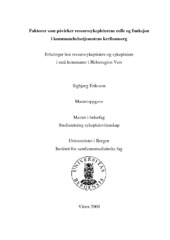| dc.description.abstract | Cancer care and palliative care are two challenging and complicated disciplines which require good interaction between different personnel and levels in the health service. This is documented both in political studies and through research. Based on national reports and documents, a series of networks were established in western Norway health care region, the first starting in 2002. Through binding agreements, resource nurses in cancer care and palliative care used these networks to secure good quality on treatment and care of patients with cancer and patients in need of palliative care. The thought behind this study is to look into the network of cancer care and palliative care and how it is experienced by the resource nurses who are members of this network. Together with nurses in the primary health care, they are central participants in cancer care, and they can show us if the network is working as planned. This study have a qualitative method with a phenomenological-hermeneutic approach. The main focus in the interviews was the connections of contextual comprehension in a systems theoretical perspective. The study revealed that the role of the resource nurses, who had established cooperation- and interaction routines and/or had a degree of freedom in their work, had better results in networking. Another key aspect is that the role of the resource nurses is different in theory and practice. I also found a lack of knowledge of the network group and the resource nurses function in primary health care. The conclusions show that it is important with knowledge to the networks, knowing its purpose and the resource nurses function area, in all areas in the health service. The knowledge base of the resource nurses and the field of responsibility of the different participants in the networks, need to be common knowledge in all areas of health service. The foundation in binding agreements, where the participants function and area of responsibility is clearly described, is also important for the resource nurses role and executive function. | en_US |
